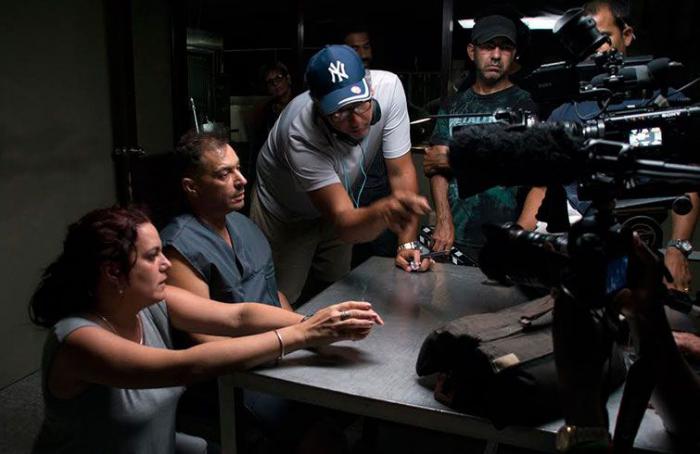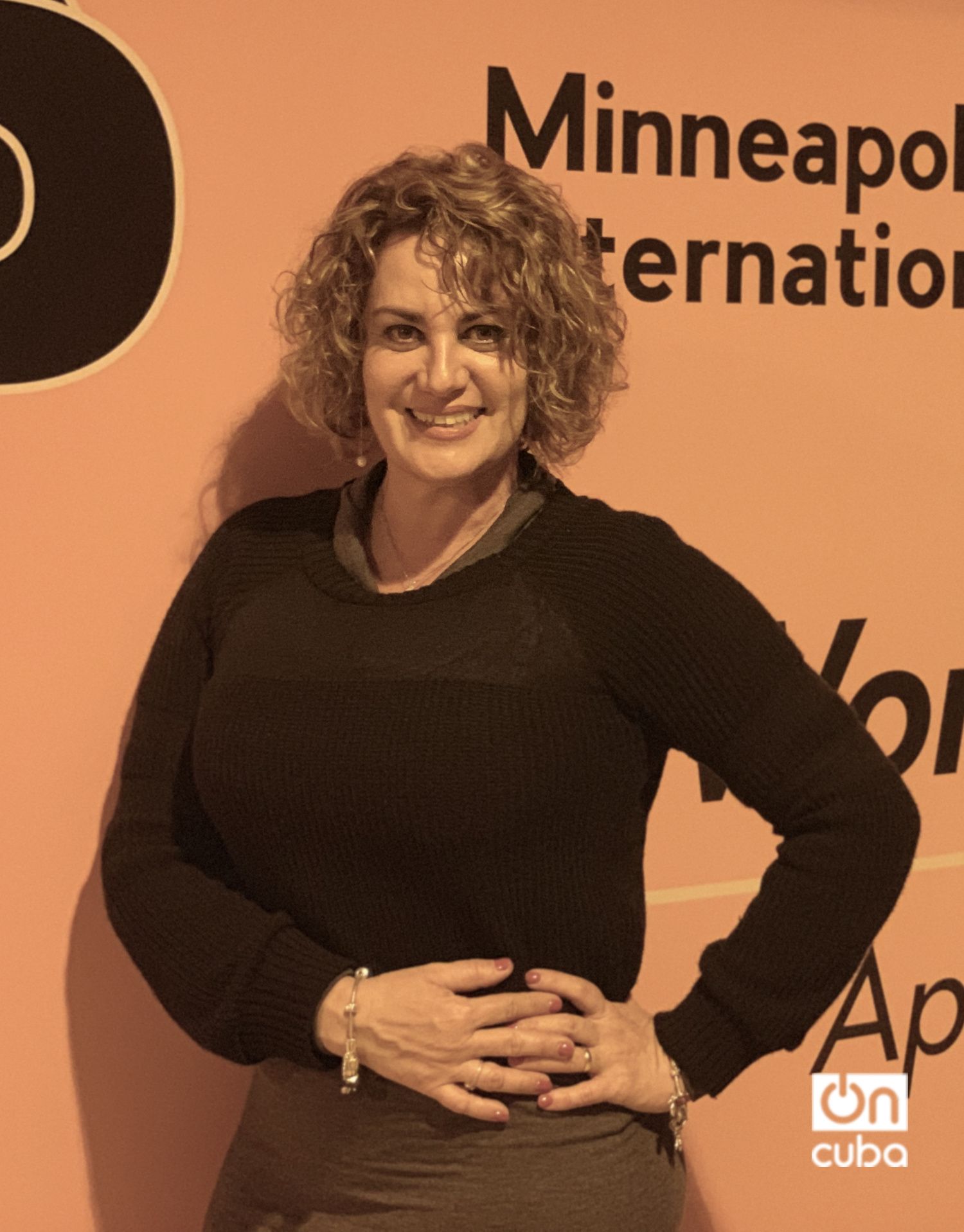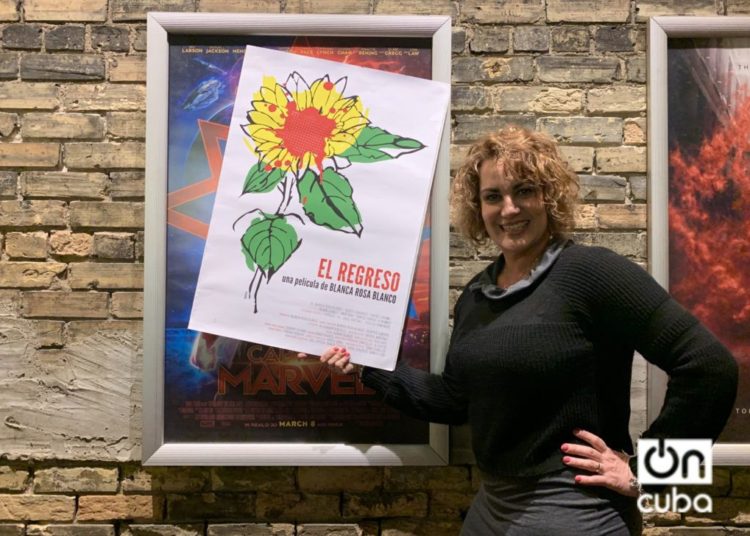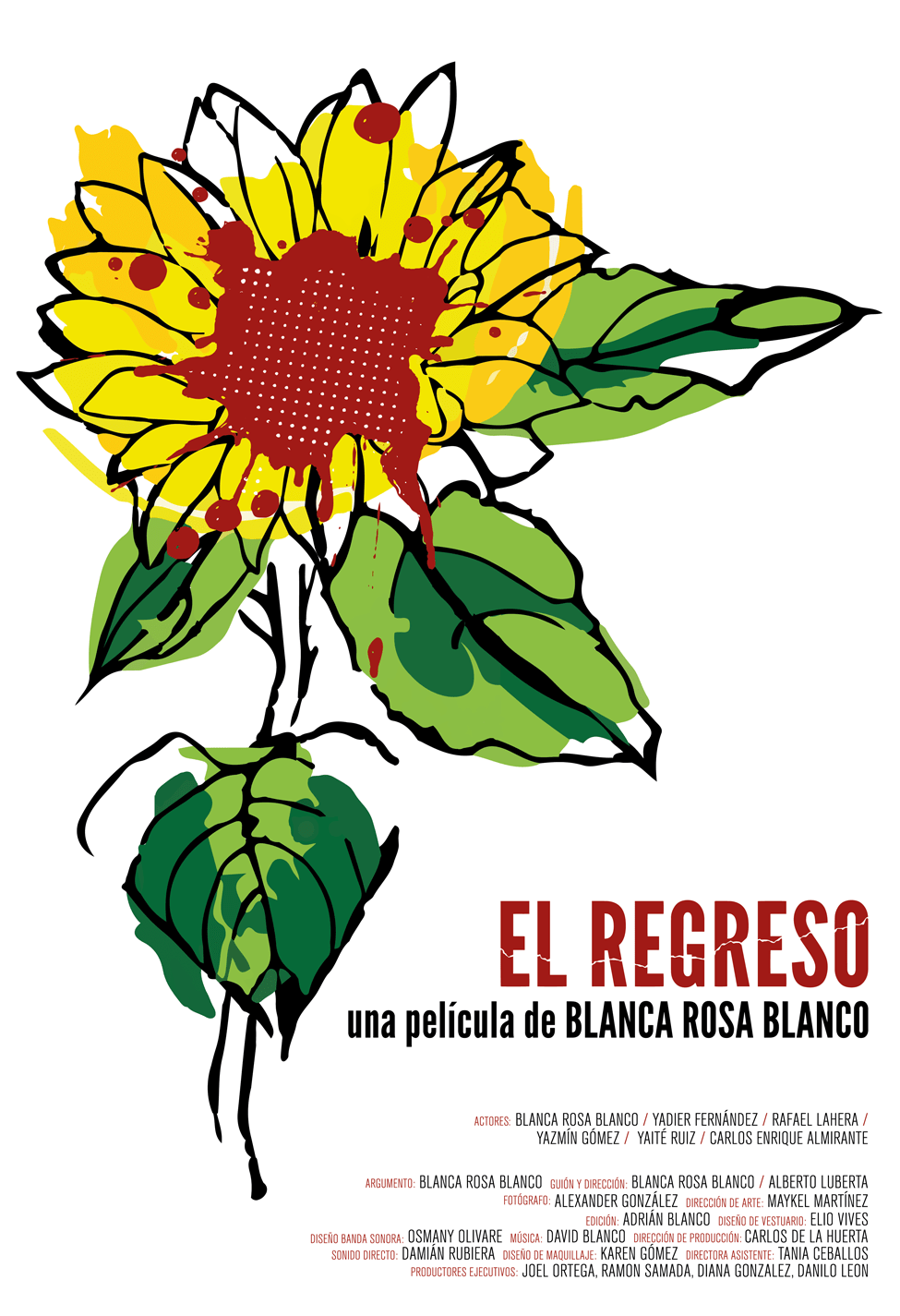Spring came to the cold northern state of Minnesota and with it the visit of Cuban actress ̶ and now director ̶ Blanca Rosa Blanco. She was there to present her first feature, El regreso (The Return), at the 10th Cuban Film Festival held in the capital, Minneapolis.
After 25 years as an actress, Blanca Rosa surprises playing three roles at the same time in cinema: playing a leading role, and as director and screenwriter. It is a show of boldness and at the same time of maturity for having decided to give rein to her artistic concerns.
How did the idea of the movie come about?
It arose while I was playing Major Mónica in the police series “Tras la huella.” During those 10 years I realized that television had certain codes that did not allow me to do everything I wanted and I always thought that cinema was the ideal platform to exploit all the resources of the detective genre.
I wanted to expand my expectations and put myself to the test in front of the Cuban public, which was also demanding a different cinema. Actors are always very exposed to public opinion, we are constantly taking note, and I was always receiving.
How much does Patricia (protagonist of El regreso) have of Major Mónica from “Tras la huella”?
I think they are characters that can’t be divorced. In Cuba there is definitely the antecedent of the same actress, the same person who played a character for 10 years. There will inevitably be an association. Even so, I try to separate them.
Patricia’s character is less strong, more sensitive, and she exposes herself more. She has the possibility of being more courageous, of taking the reins, of knowing that if she is not the one who resolves the conflicts, no one else will do it, and her own personality allows her to get to the end.
This is something that Mónica did not have. That character was conditioned by story frameworks for television and I think I was able to somehow settle that debt I had of giving it continuity through another character, in this case Patricia.
The detective story is a genre that I like. I’d love to do a saga of detective films. And give it a sensual touch, that they not always be these women with traditionally masculine, strict values, with a hard look, close to masculinity. I wanted to defend that this character be elegant, that it wears high heels, that it knows how to handle them and that that was not an impediment to pursue her goals.
Is there any experience that has marked you during the filming?
When we were visiting locations, we found the space that would be Patricia’s room. When I decide that is what we wanted, I realize that the railroad track is seen from the balcony. And I said: But how am I going to go out on the balcony and see the railroad track and not have a train? I need a train. My husband, Carlos de la Huerta, who is also the producer of the film, told me that the chances of that happening were very slim.
I had already gotten used to the idea, but I kept thinking about the day I would stand on the balcony and did not see the train pass by. I always dreamed that this train would pass, and we would not have it. It hurt, I felt it.
The day we went to film the sequence, the second day of shooting in Matanzas, after having rehearsed a couple of times, when I stand on the balcony…I see the train coming…. And I pause; that’s why that shot was left in, where I’m seen from the back, with only my hair beating, that I could maybe have cut it, but I absolutely refused to do so.
When I see the train coming, I say to myself: I have to stay here, and wait. It was also a blue train, long, beautiful, the dream train. I stood like saying: God, it can’t be. I stood still, the actress and the director debating on the balcony, wondering what was right at that moment. I thought it was to stay and wait. And that’s how it was.
When we said cut I jumped for joy, everyone shouted with emotion, because it was already like an obsession for me. And I think life gave me the train. It went by and it was like a sign from God or destiny.
That, and also having convened nearly 30,000 people for the David Blanco concert. They spent hours in that square, to be able to shoot the concert and use all that real audience. We were there from 6 p.m. until 4 a.m. that day. David Blanco repeating the songs we wanted to be hummed.
It is one of the first sequences that I dreamed of and it came out as such. Having that shot filled with a huge audience, that was there knowing that it was going to be part of the film. They aren’t extras, they’re people who wanted to be there. It is another of the great satisfactions that the film has given me.
What challenges have you encountered when entering this world of filmmaking, which is still mostly dominated by men?
I have never felt that I can’t achieve something because I’m a woman. I think that regardless of the real and objective things, some have also become labels which I do not feel I am part of.
I think I have done a project where I summoned both men and women, who respected an idea and who started believing in it and in the role each one had at the time. They were facing a person who was directing a project, who had conceived it and was also giving them work, whether they were male or female.
People who make movies or art have a different sensibility. They see life from another point of view, and I think they appreciate and integrate without thinking much if they are working with a man or a woman. Simply, maybe by having things organized, clear, or safe, people hop on the train with you and move on.
Whether it happened or not, I was very far from being affected by it or that it was becoming a problem for me. My priority was that the movie be good. Of the challenges in general, there were many things that were unknown to me and I started learning them. For some I prepared myself and I was more secure, with others it was a more difficult process.
For example, when the shooting finished I stayed with the director of the soundtrack doing all the sound postproduction, until the end. And that, I believe, was one of my most intense challenges and discoveries. The whole process of sound effects, editing, mixing…I discovered it very organically for months. I enjoyed it a lot.
Finishing the film was as interesting as making this process practical. They are such diverse moments of creation, from the idea, to begin the filming, to start to visualize it, from the moment you have the actor, until suddenly everything becomes music, image, a whole, with an excellent work team.
Osmany Olivare is an artist of the soundtrack, he has 54 films and it is an honor that he has worked with us. For the director of photography, Alexander González, it was his debut. For the editor, Alexander Blanco (my brother), it was his first film production; it was David Blanco’s first time he made music for movies. Luckily we had a team made up of experienced people and rookies who were supporting us all the time and without disputing the roles, whether of a man or woman.
I can’t stop recognizing that in the world it is difficult for us women to enter into processes that fundamentally have been carried out by men, but in the end I think we are always fighting for that space to exist, and not to become victims. I think that more than anything it is about imposing oneself, I think you have to work and try, even with all the prejudices that exist.

How did you manage to play at the same time the roles of director, actress and screenwriter of the film?
Actually it’s going to cost me a lot of work to try to do it that way again. I think I took too much of a risk. It physically and mentally exhausted me. Having the actor in front of you and suddenly looking at him as an actress and as a director. I had the possibility of having actors who knew that they were exposing themselves to repetition, because they knew they had a person in front of them who could constantly want more, because I was watching them. They knew that they were facing an actress who knew the mechanism and could look them in the eye and say: “No, we’ll repeat.” And at the same time as the director, they had the actress in front of them. I think that if it was difficult for me, it was difficult for them too. That’s why I thank the cast for their patience, for having given their all.
In the entire movie there is only one sequence that I didn’t do, that I didn’t visualize; but the seven weeks of shooting were at that level of intensity. We rehearsed, we watched, we filmed, I looked at it again, it was done again and there it is. It was very complicated and I think I’m not going to risk it again; I want to devote myself more to the direction of actors. If I’m back as an actress, it will be something small, also because I am an actress and I will not give up on that, definitely.
Why Matanzas?
I was doing some shows in Matanzas for two years. On the road from Havana to Matanzas and vice versa every Wednesday. And every time I entered the city I thought I had to film there. That bay is wonderful. Matanzas has a beautiful view and light. I wanted to leave the Havana environment, leave the downtown and see another landscape, another color of the sun. The reason is that I fell in love with that place, I was looking at it, I was enjoying it for two years all those Wednesdays.
A great deal of the film is in Matanzas. There are interiors that we had to do in Havana because of production issues. We managed to have this beautiful wooden house in Havana, which I wanted to be different, atypical. And we reproduced the room in Matanzas, which has this balcony, thanks to Maykel Martinez, who did an extraordinary job in art direction.
Matanzas also has history: Carilda, José Jacinto Milanés, Estorino, Rufo Caballero. People who have been there, who lived there. And I believe that somewhere when people say Matanzas, they should be remembered. That’s the reason for this sequence in the city’s cemetery. That sequence wasn’t in the script but when I discovered the cemetery I thought I had to shoot there to pay a tribute. I think it was one of those magical days of the movie.

Answering a question from the audience, you said that you liked to think that the film had a progressive and not feminist character. Why?
Progressive because of the gender, the attitude those of us who made the project have, to move forward with a more progressive project of thought and not see it from the point of view of woman victim. I prefer the idea that we are capable of defending ourselves as progressives, rather than only putting ourselves in the position of victims. That’s the reason for the final text of denunciation: that for each woman who is silent two are condemned to sexual abuse. For me that means being progressive. Maybe the word has been used a lot in more political terms, I am trying to use it as the concept itself.
Progressive so that we can move forward in terms of thinking, in terms of women being able to demonstrate things based on thinking and that they come out strong from that. That they be sensitized. It speaks of a human thought and that it must advance. I do not like framing things, I’m afraid of labels.
What’s next for El regreso?
The movie is very young. It has only been touring for two months and sometimes people go to the movies, outside of Cuba, when they investigate what awards it has won, where it has been, and this is really the first time it has been outside of Cuba. The only reference those who went to the screening had was what happened in Havana’s cinemas, which were in photos on the web and they could draw their conclusions from what they saw. But I did not know how it would work outside of Cuba. In the screening there were Colombians, Hondurans, Mexicans…. Diverse people, and for me it was important to take the temperature of the reactions, the questions, the attitude, that the people did not get up and leave the theater.
The journey will begin from now on. We’re going to the Havana Film Festival in New York from April 8 to 15. We have an invitation to a Latin film festival in Frankfurt in May. This is a 2019 film, which was presented in 2018. It is beginning its journey and the important thing is to enjoy it and to let it surprise us.
With regard to criticism, I have been exposed to that for so many years that for me criticism is not something that can surprise me. I believe that everyone has their opinion, and can say it and establish a debate. I give a lot of credit to critics’ specialization, I prefer to talk, instead of silence.
What projects do you have for your immediate future?
I finished the film and had a project eight years ago with Jorge Luis Sánchez, the director of El Benny. It is a project about the life of Julián del Casal, which was finally achieved eight years ago. The Havana Film Festival will supposedly premiere it. As an actress, it’s an important film for me. The 19th century, all those dreams an actor can have when he is 20 years old, finally came true. For an actor, the whole structure of the 19th century represents studying an era, leaving the contemporary, investigating. It’s not just wearing the dress, it’s knowing how to wear the dress, the hat, the way of looking, of using the fan.
I think I closed a cycle of my life with this movie. My character actually existed and I am fascinated. I’m convinced that it’s going to be absolutely new, because Jorge Luis’s production is also something different.
I have other projects that I will start writing. But most of all I want to enjoy the process of what is happening with El regreso and dedicate to it the time it deserves, because they were many years of work. We are now beginning to harvest what we sowed.











